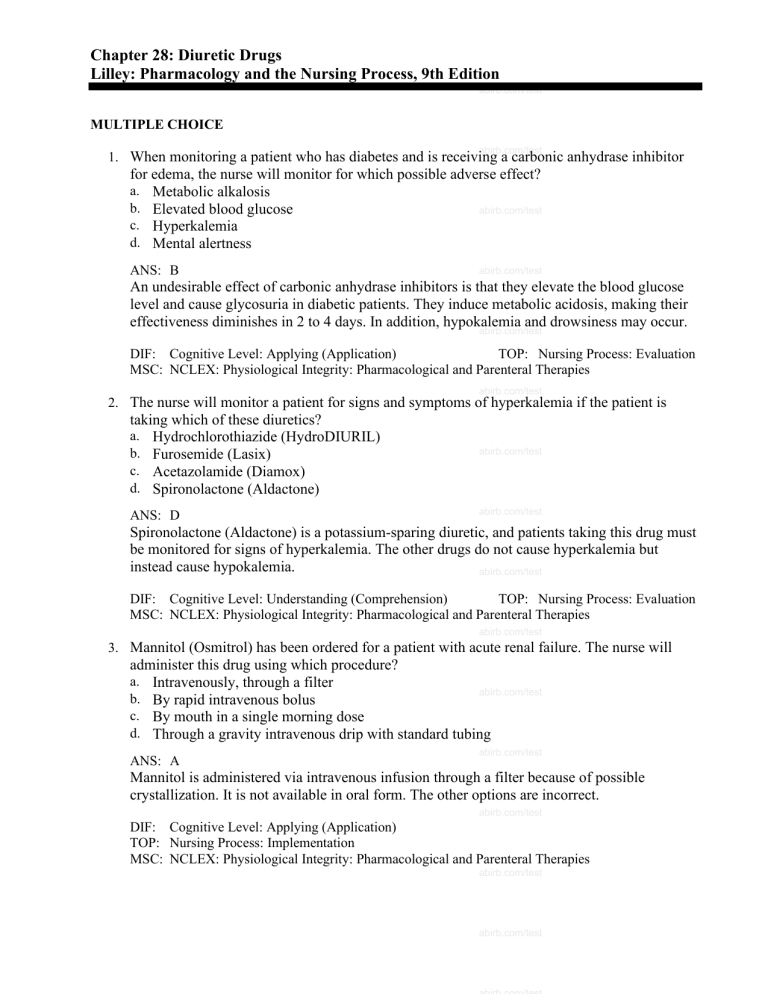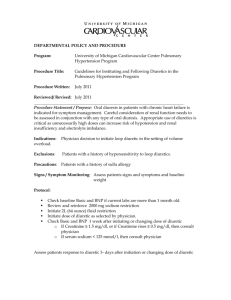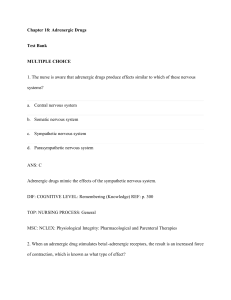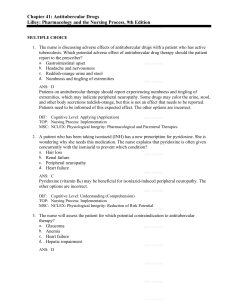
Chapter 28: Diuretic Drugs Lilley: Pharmacology and the Nursing Process, 9th Edition abirb.com/test MULTIPLE CHOICE abirb.com/test 1. When monitoring a patient who has diabetes and is receiving a carbonic anhydrase inhibitor for edema, the nurse will monitor for which possible adverse effect? a. Metabolic alkalosis b. Elevated blood glucose abirb.com/test c. Hyperkalemia d. Mental alertness ANS: B abirb.com/test An undesirable effect of carbonic anhydrase inhibitors is that they elevate the blood glucose level and cause glycosuria in diabetic patients. They induce metabolic acidosis, making their effectiveness diminishes in 2 to 4 days. In addition, hypokalemia and drowsiness may occur. abirb.com/test DIF: Cognitive Level: Applying (Application) TOP: Nursing Process: Evaluation MSC: NCLEX: Physiological Integrity: Pharmacological and Parenteral Therapies abirb.com/test 2. The nurse will monitor a patient for signs and symptoms of hyperkalemia if the patient is taking which of these diuretics? a. Hydrochlorothiazide (HydroDIURIL) b. Furosemide (Lasix) c. Acetazolamide (Diamox) d. Spironolactone (Aldactone) abirb.com/test ANS: D abirb.com/test Spironolactone (Aldactone) is a potassium-sparing diuretic, and patients taking this drug must be monitored for signs of hyperkalemia. The other drugs do not cause hyperkalemia but instead cause hypokalemia. abirb.com/test DIF: Cognitive Level: Understanding (Comprehension) TOP: Nursing Process: Evaluation MSC: NCLEX: Physiological Integrity: Pharmacological and Parenteral Therapies abirb.com/test 3. Mannitol (Osmitrol) has been ordered for a patient with acute renal failure. The nurse will administer this drug using which procedure? a. Intravenously, through a filter abirb.com/test b. By rapid intravenous bolus c. By mouth in a single morning dose d. Through a gravity intravenous drip with standard tubing ANS: A abirb.com/test Mannitol is administered via intravenous infusion through a filter because of possible crystallization. It is not available in oral form. The other options are incorrect. abirb.com/test DIF: Cognitive Level: Applying (Application) TOP: Nursing Process: Implementation MSC: NCLEX: Physiological Integrity: Pharmacological and Parenteral Therapies abirb.com/test abirb.com/test 4. Furosemide (Lasix) is prescribed for a patient who is about to be discharged, and the nurse provides instructions to the patient about the medication. Which statement by the nurse is abirb.com/test correct? a. “Take this medication in the evening.” b. “Avoid foods high in potassium, such as bananas, oranges, fresh vegetables, and dates.” abirb.com/test c. “If you experience weight gain, such as 5 pounds or more per week, be sure to tell your physician during your next routine visit.” d. “Be sure to change positions slowly and rise slowly after sitting or lying so as to abirb.com/test prevent dizziness and possible fainting because of blood pressure changes.” ANS: D Orthostatic hypotension is a possible problem with diuretic therapy. Foods high in potassium should be eaten more often, and the drug needs to be takenabirb.com/test in the morning so that the diuretic effects do not interfere with sleep. A weight gain of 5 pounds or more per week must be reported immediately. abirb.com/test DIF: Cognitive Level: Applying (Application) TOP: Nursing Process: Implementation MSC: NCLEX: Physiological Integrity: Pharmacological and Parenteral Therapies abirb.com/test 5. When reviewing the mechanisms of action of diuretics, the nurse knows that which statement is true about loop diuretics? a. They work by inhibiting aldosterone. b. They are very potent, having a diuretic effect that lastsabirb.com/test at least 6 hours. c. They have a rapid onset of action and cause rapid diuresis. d. They are not effective when the creatinine clearance decreases below 25 mL/min. ANS: C abirb.com/test The loop diuretics have a rapid onset of action; therefore, they are useful when rapid onset is desired. Their effect lasts for about 2 hours, and a distinct advantage they have over thiazide diuretics is that their diuretic action continues even when creatinine abirb.com/testclearance decreases below 25 mL/min. DIF: Cognitive Level: Understanding (Comprehension) abirb.com/test TOP: Nursing Process: Assessment MSC: NCLEX: Physiological Integrity: Pharmacological and Parenteral Therapies 6. When monitoring a patient who is taking hydrochlorothiazide (HydroDIURIL), the nurse abirb.com/test notes that which drug is most likely to cause a severe interaction with the diuretic? a. Digitalis b. Penicillin c. Potassium supplements abirb.com/test d. Aspirin ANS: A There is an increased risk for digitalis toxicity in the presence of hypokalemia, which may abirb.com/test develop with hydrochlorothiazide therapy. Potassium supplements are often prescribed with hydrochlorothiazide therapy to prevent hypokalemia. The other options do not have interactions with hydrochlorothiazide. abirb.com/test DIF: Cognitive Level: Applying (Application) abirb.com/test TOP: Nursing Process: Implementation MSC: NCLEX: Physiological Integrity: Pharmacological and Parenteral Therapies abirb.com/test 7. When a patient is receiving diuretic therapy, which of these assessment measures would best reflect the patient’s fluid volume status? a. Blood pressure and pulse abirb.com/test b. Serum potassium and sodium levels c. Intake, output, and daily weight d. Measurements of abdominal girth and calf circumference ANS: C abirb.com/test Urinary intake and output and daily weights are the best reflections of a patient’s fluid volume status. abirb.com/test DIF: Cognitive Level: Understanding (Comprehension) TOP: Nursing Process: Assessment MSC: NCLEX: Safe and Effective Care Environment: Management of Care abirb.com/test 8. A patient is being discharged to home on a single daily dose of a diuretic. The nurse instructs the patient to take the dose at which time so it will be least disruptive to the patient’s daily routine? abirb.com/test a. In the morning b. At noon c. With supper d. At bedtime abirb.com/test ANS: A It is better to take the diuretic medication early in the morning to prevent urination during the night. Taking the diuretic at the other times may cause nighttime urination and disrupt sleep. abirb.com/test DIF: Cognitive Level: Applying (Application) TOP: Nursing Process: Implementation abirb.com/test MSC: NCLEX: Safe and Effective Care Environment: Management of Care 9. A patient is started on a diuretic for antihypertensive therapy. The nurse expects that a drug in which class is likely to be used initially? a. Loop diuretics b. Osmotic diuretics c. Thiazide diuretics d. Potassium-sparing diuretics abirb.com/test abirb.com/test ANS: C The Eighth Report of the Joint National Committee on Prevention, Detection, Evaluation, and abirb.com/test Treatment of High Blood Pressure (JNC-8) guidelines reaffirmed the role of thiazide diuretics as among the first-line drugs in the treatment hypertension. The other drug classes are not considered first-line treatments. abirb.com/test DIF: Cognitive Level: Applying (Application) TOP: Nursing Process: Implementation MSC: NCLEX: Physiological Integrity: Pharmacological and Parenteral Therapies abirb.com/test abirb.com/test 10. A patient in the neurologic intensive care unit is being treated for cerebral edema. Which class of diuretic is used to reduce intracranial pressure? a. Loop diuretics b. Osmotic diuretics c. Thiazide diuretics d. Vasodilators abirb.com/test abirb.com/test ANS: B Mannitol, an osmotic diuretic, is commonly used to reduce intracranial pressure and cerebral edema resulting from head trauma. abirb.com/test DIF: Cognitive Level: Understanding (Comprehension) TOP: Nursing Process: Planning MSC: NCLEX: Physiological Integrity: Pharmacological and Parenteral Therapies abirb.com/test 11. A 79-year-old patient is taking a diuretic for treatment of hypertension. This patient is very independent and wants to continue to live at home. The nurse will know that which teaching point is important for this patient? abirb.com/test a. He should take the diuretic with his evening meal. b. He should skip the diuretic dose if he plans to leave the house. c. If he feels dizzy while on this medication, he needs to stop taking it and take potassium supplements instead. abirb.com/test d. He needs to take extra precautions when standing up because of possible orthostatic hypotension and resulting injury from falls. ANS: D abirb.com/test Caution must be exercised in the administration of diuretics to the older adults because they are more sensitive to the therapeutic effects of these drugs and are more sensitive to the adverse effects of diuretics, such as dehydration, electrolyte loss, dizziness, and syncope. abirb.com/test Taking the diuretic with the evening meal may disrupt sleep because of nocturia. Doses should never be skipped or stopped without checking with the prescriber. DIF: Cognitive Level: Applying (Application) abirb.com/test TOP: Nursing Process: Implementation MSC: NCLEX: Physiological Integrity: Pharmacological and Parenteral Therapies MULTIPLE RESPONSE abirb.com/test 1. The nurse is monitoring a patient who is taking a potassium-sparing diuretic. Which of the drugs or drug classes may have an interaction with this type of diuretic? (Select all that abirb.com/test apply.) a. Lithium b. Vancomycin abirb.com/test c. Potassium supplements d. NSAIDs e. Antidiabetic drugs f. ACE inhibitors abirb.com/test ANS: A, C, D, F abirb.com/test abirb.com/test Taking lithium with potassium-sparing diuretics may cause lithium toxicity; taking ACE inhibitors or potassium supplements may lead to hyperkalemia. Taking NSAIDs with potassium-sparing diuretics may cause a decreased diureticabirb.com/test response. There are no interactions with vancomycin or antidiabetic drugs and potassium-sparing diuretics. DIF: Cognitive Level: Applying (Application) abirb.com/test TOP: Nursing Process: Assessment MSC: NCLEX: Physiological Integrity: Reduction of Risk Potential 2. When assessing a patient who is receiving a loop diuretic,abirb.com/test the nurse looks for the manifestations of potassium deficiency, which would include what symptoms? (Select all that apply.) a. Dyspnea abirb.com/test b. Constipation c. Tinnitus d. Muscle weakness e. Anorexia abirb.com/test f. Lethargy ANS: D, E, F Symptoms of hypokalemia include anorexia, nausea, lethargy, muscle weakness, mental abirb.com/test confusion, and hypotension. The other symptoms are not associated with hypokalemia. DIF: Cognitive Level: Applying (Application) TOP: Nursing Process: Evaluation MSC: NCLEX: Physiological Integrity: Physiological Adaptation abirb.com/test COMPLETION abirb.com/test 1. A patient is to receive furosemide (Lasix) via a percutaneous endoscopic gastrostomy (PEG) tube. The order reads, “Give furosemide, 80 mg, per PEG tube once daily.” The medication is available in a liquid form, 40 mg/5 mL. Identify how many milliliters the nurse will abirb.com/test administer for each dose. _______ ANS: 10 mL abirb.com/test 40 mg:5 mL :: 80 mg:x mg (40 × x) = (5 × 80); 40x = 400; x = 10 mL abirb.com/test DIF: Cognitive Level: Applying (Application) TOP: Nursing Process: Implementation MSC: NCLEX: Physiological Integrity: Pharmacological and Parenteral Therapies abirb.com/test 2. The order for a child reads, “Give furosemide (Lasix) 2 mg/kg IV STAT.” The child weighs 33 pounds. Identify how many milligrams the child will receive for this dose. _______ abirb.com/test ANS: 30 mg abirb.com/test First, convert 33 pounds to kilograms: 33 pounds ÷ 2.2 = 15 kg. Next, calculate mg/kg: 2 mg/kg × 15 kg = 30 mg. abirb.com/test DIF: Cognitive Level: Applying (Application) TOP: Nursing Process: Implementation abirb.com/test MSC: NCLEX: Physiological Integrity: Pharmacological and Parenteral Therapies abirb.com/test abirb.com/test abirb.com/test abirb.com/test abirb.com/test abirb.com/test abirb.com/test abirb.com/test abirb.com/test abirb.com/test abirb.com/test abirb.com/test abirb.com/test abirb.com/test




